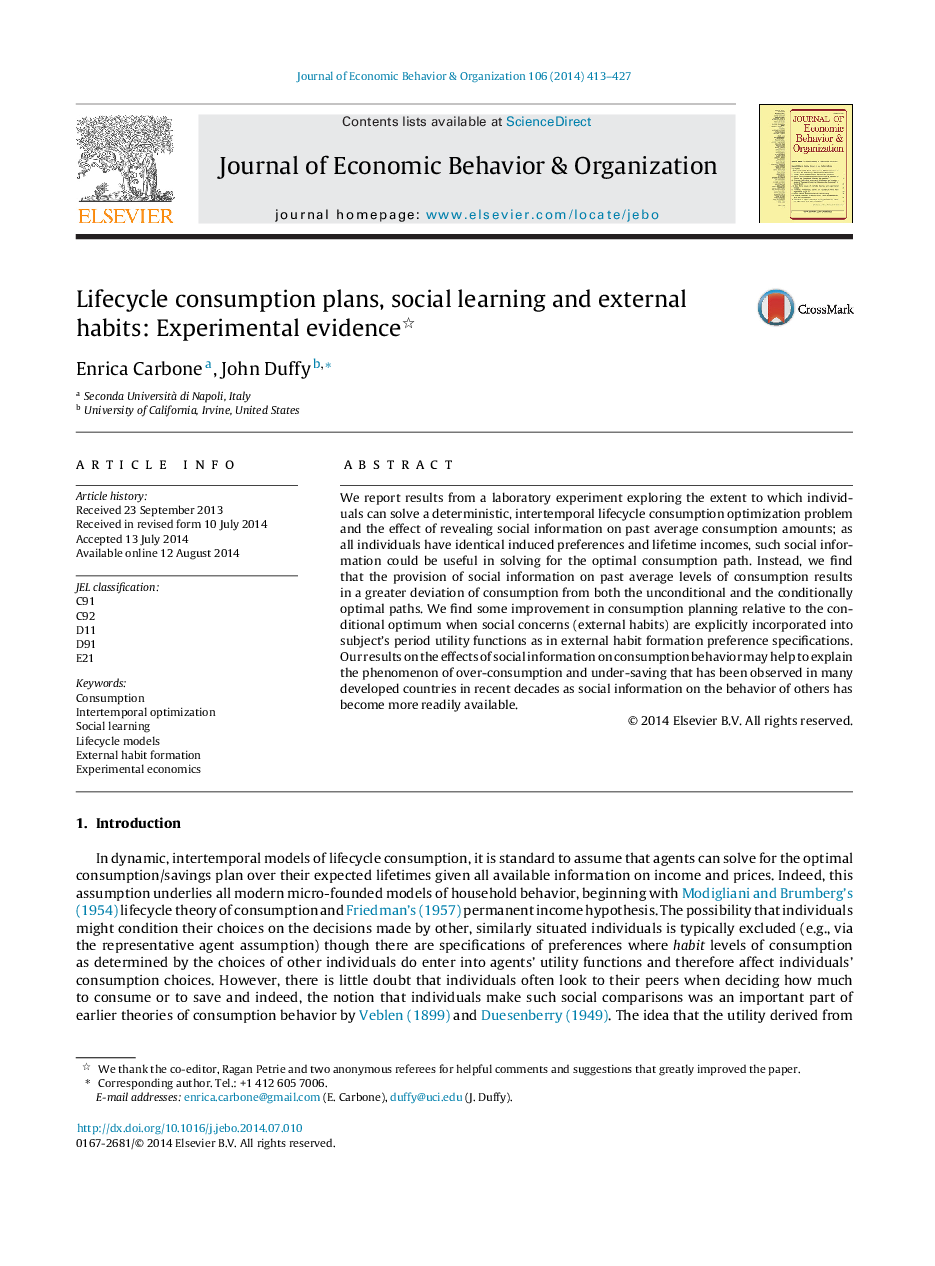| کد مقاله | کد نشریه | سال انتشار | مقاله انگلیسی | نسخه تمام متن |
|---|---|---|---|---|
| 7243512 | 1471657 | 2014 | 15 صفحه PDF | دانلود رایگان |
عنوان انگلیسی مقاله ISI
Lifecycle consumption plans, social learning and external habits: Experimental evidence
ترجمه فارسی عنوان
طرحهای مصرف چرخه زندگی، یادگیری اجتماعی و عادات خارجی: شواهد تجربی
دانلود مقاله + سفارش ترجمه
دانلود مقاله ISI انگلیسی
رایگان برای ایرانیان
کلمات کلیدی
ترجمه چکیده
ما نتایج یک آزمایشی آزمایشگاهی را بررسی می کنیم که در آن میزان افرادی می توانند مشکل بهینه سازی مصرف چرخه دور زیستی و بینظمی را حل کنند و تأثیر اطلاعات اجتماعی بر میزان مصرف متوسط مصرفی گذشته را بررسی کنند. همانطور که همه افراد دارای ترجیحات و درآمد های طول عمر القا شده اند، چنین اطلاعات اجتماعی می توانند در حل مسیر مصرف مطلوب مفید باشند. در عوض، ما متوجه می شویم که ارائه اطلاعات اجتماعی در سطوح متوسط مصرف گذشته منجر به انحراف بیشتری از مصرف از راه های بدون قید و شرط و مطلوب می شود. ما برخی از بهبود در برنامه ریزی مصرف نسبت به مطلوب شرطی پیدا می کنیم زمانی که نگرانی های اجتماعی (عادت های خارجی) به طور صریح در توابع مفید دوره دوره ای به عنوان مشخصات ترجیح تشکیل عادت خارجی وارد شده است. نتایج ما در مورد تأثیر اطلاعات اجتماعی در رفتار مصرفی ممکن است به توضیح پدیده مصرف بیش از حد و کمبود صرفه جویی کمک کند که در دهه های اخیر در بسیاری از کشورهای پیشرفته دیده شده است؛ زیرا اطلاعات اجتماعی در مورد رفتار دیگران به راحتی قابل دسترسی است.
موضوعات مرتبط
علوم انسانی و اجتماعی
اقتصاد، اقتصادسنجی و امور مالی
اقتصاد و اقتصادسنجی
چکیده انگلیسی
We report results from a laboratory experiment exploring the extent to which individuals can solve a deterministic, intertemporal lifecycle consumption optimization problem and the effect of revealing social information on past average consumption amounts; as all individuals have identical induced preferences and lifetime incomes, such social information could be useful in solving for the optimal consumption path. Instead, we find that the provision of social information on past average levels of consumption results in a greater deviation of consumption from both the unconditional and the conditionally optimal paths. We find some improvement in consumption planning relative to the conditional optimum when social concerns (external habits) are explicitly incorporated into subject's period utility functions as in external habit formation preference specifications. Our results on the effects of social information on consumption behavior may help to explain the phenomenon of over-consumption and under-saving that has been observed in many developed countries in recent decades as social information on the behavior of others has become more readily available.
ناشر
Database: Elsevier - ScienceDirect (ساینس دایرکت)
Journal: Journal of Economic Behavior & Organization - Volume 106, October 2014, Pages 413-427
Journal: Journal of Economic Behavior & Organization - Volume 106, October 2014, Pages 413-427
نویسندگان
Enrica Carbone, John Duffy,
